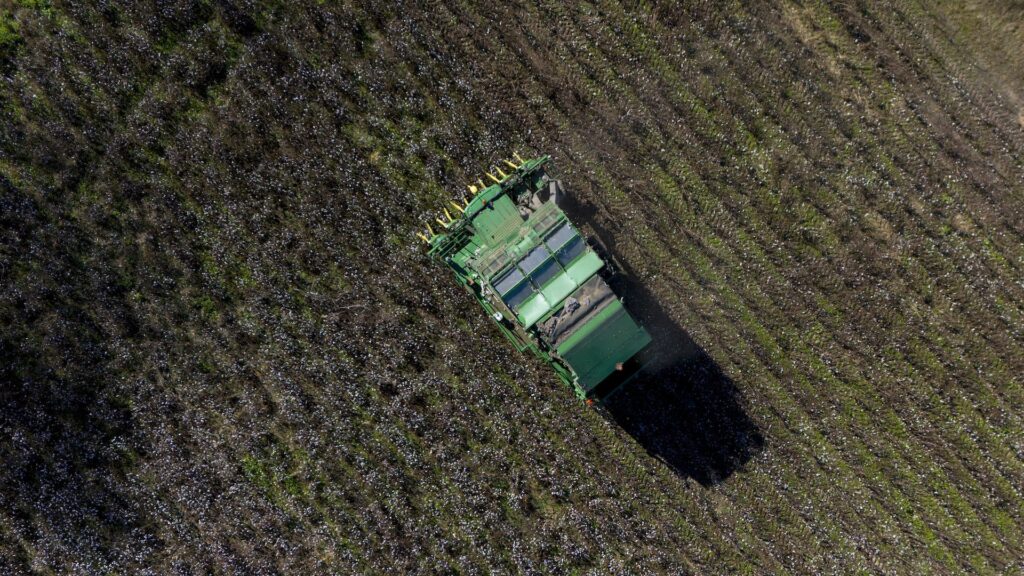The aftermath of Hurricane Helene is still a harsh reality for southern farmers. Equipment lies mangled, trees are snapped, and vast fields remain disrupted. Helene, a Category 4 hurricane, unleashed its fury on Georgia and neighboring states, leaving farmers grappling with anxiety and uncertainty.
Chris Hopkins, a farmer from Toombs County, Georgia, shares his emotional turmoil as he drags fallen tree limbs from his farm just outside Savannah. With $5.5 billion in damages, Georgia farmers struggle to decide whether to rebuild or quit farming altogether.
Hurricane Helene hit the south hard, leaving a path of destruction. Equipment, crops, and livelihoods were destroyed as the storm swept through. Cotton fields, pecan orchards, and poultry farms were particularly affected, costing farmers billions. In some areas, recovery seems a distant goal.
The University of Georgia reports Georgia farmers alone face storm losses of $5.5 billion. North Carolina endured $3.1 billion in damages, while Virginia, South Carolina, and Florida combined lost over $1 billion due to record rainfall and flooding.
Chris Hopkins lost half of his cotton crop, valued at $430,000. Insurance won’t cover the full extent, leaving Hopkins with a challenging cleanup and repair process.
The storm didn’t spare anyone, with winds reaching up to 310 miles away. Pecans and poultry are among the hardest hit. Timothy Coolong, a horticulture professor, hints at the overwhelming nature of the damage.
Despite the massive impact, state funds can’t be used for direct disaster aid due to legal reasons. However, a U.S. Congress spending bill may bring relief.
Jeffrey Pridgen, a poultry farmer, is among those praying for aid to arrive soon. With poultry houses destroyed, Pridgen faces an uphill battle to restore his livelihood.
Productivity has been hit hard. Pridgen’s story echoes across the region – a costly reconstruction task that may take years.
The poultry industry alone faces a $683 million challenge. Farmers are in ‘rebuilding mode,’ and production lags behind.
Consumer prices might remain stable, but pecans could see a spike due to Georgia’s significant production. Adjemian from the University of Georgia suggests storms like Helene usually have limited consumer impact, but pecan scarcity might be an exception.
Recovering from these losses adds stress to an already tough agricultural season. Cotton prices were low, making profits rarer, and now each farmer faces further strain.
Helene cost Georgia cotton farmers a third of their crop, with total losses at $560 million. The struggle to recover is daunting.
Georgia farmers were still grappling with losses from Hurricane Michael in 2018, and now Helene compounds their hardships. ‘Everybody lost something,’ said Taylor Sills, driving home the tragedy’s widespread effect.
Georgia’s poultry industry endured a massive hit with numerous chicken houses needing reconstruction. The subsequent effects on production may linger for over a year.
However, not all crops were affected equally. Michael Adjemian suggests consumer prices may not see major changes, except possibly pecans, as they are a key Georgia product.
Helene’s devastation spans more than just immediate damage – it poses long-term challenges for agriculture in the south. Each farmer’s resilience will be tested in the months ahead.
The agricultural community is pulling together, offering guidance and resources. Aid may not be instant, but the spirit of camaraderie is evident.
New challenges lie ahead but the farming community remains steadfast, ready to face the reconstruction process with steadfast determination.
The road to recovery is arduous and fraught with obstacles. Farmers across the South face monumental tasks in restoring their lands and livelihoods.
As they navigate this daunting journey, their resilience and strength will be key in overcoming the challenges brought by Helene.
With heavy hearts, farmers push forward, adapting and hoping for a brighter future. The devastation spans beyond material losses, but the resolve to rebuild remains strong.
Hurricane Helene left a lasting impact on southern agriculture. Recovery may take time, but determination fuels hope. Southern farmers continue to navigate the aftermath with resilience.





